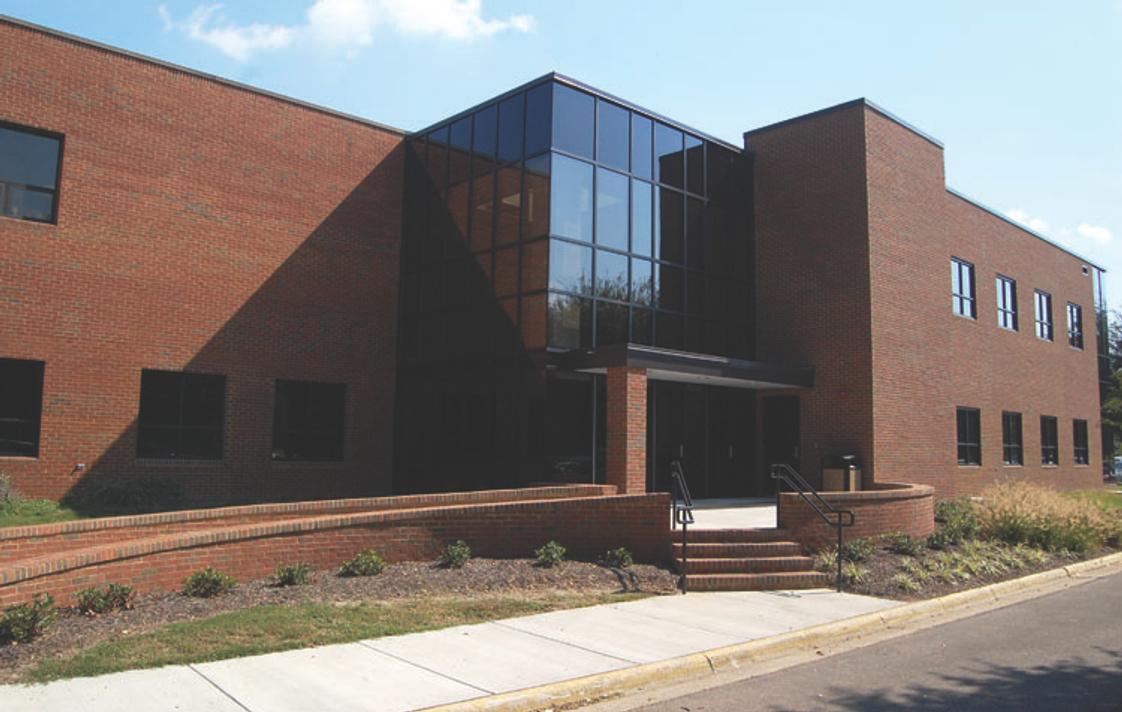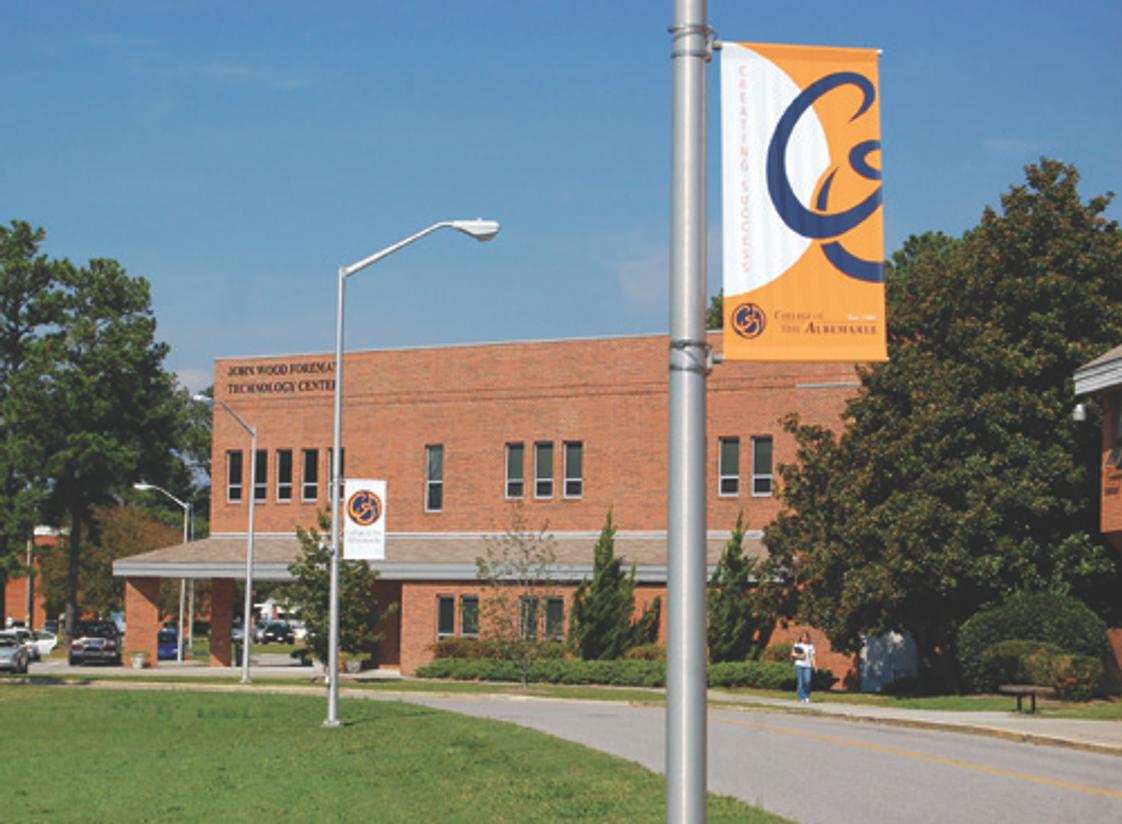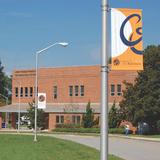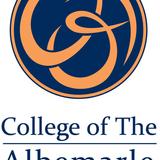- COA is a comprehensive community college committed to providing accessible education, training, and retraining for better jobs and better lives in Northeastern North Carolina.
School Highlights
College of the Albemarle serves 3,160 students (31% of students are full-time).
The college's student:teacher ratio of 12:1 is lower than the state community college average of 13:1.
Minority enrollment is 38% of the student body (majority Black), which is less than the state average of 48%.
Quick Stats (2025)
- Enrollment: 3,160 students
- In-state tuition: $2,102
- Out-state tuition: $7,404
- Student:teacher ratio: 12:1
- Minority enrollment: 38%
- Source: Integrated Postsecondary Education Data System (IPEDS)
Top Rankings
College of the Albemarle ranks among the top 20% of public schools in North Carolina for:
Category
Attribute
Affordability
School Resources
School Overview
The teacher population of 274 teachers has stayed relatively flat over five years.
College of the Albemarle
(NC) Community College Avg.
Carnegie Classification
Associate's Colleges: High Transfer-High Nontraditional
Associate's Colleges: Mixed Transfer/Career & Technical-High Nontraditional
Institution Level
At least 2 but less than 4 years
At least 2 but less than 4 years
Institution Control
Public
Public
Total Faculty
274 staff
256 staff
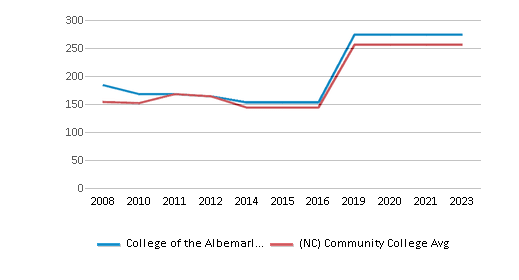
School Calendar
Student Body
The student population of College of the Albemarle has grown by 22% over five years.
The student:teacher ratio of 12:1 has increased from 9:1 over five years.
The College of the Albemarle diversity score of 0.59 is less than the state average of 0.66. The school's diversity has grown by 5% over five years.
Total Enrollment
3,160 students
2,542 students
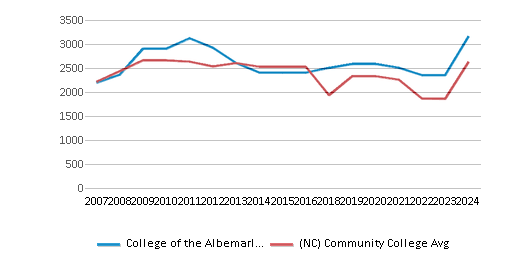
Student : Teacher Ratio
12:1
13:1
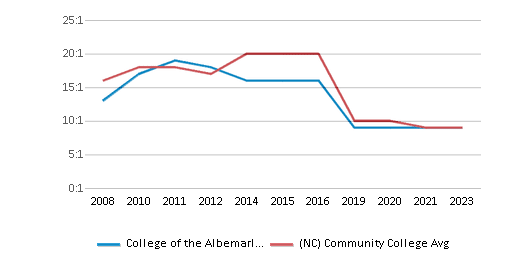
# Full-Time Students
973 students
766 students
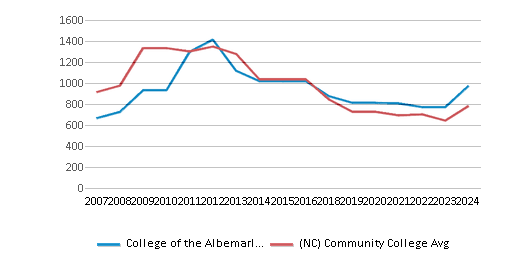
# Part-Time Students
2,187 students
1,813 students
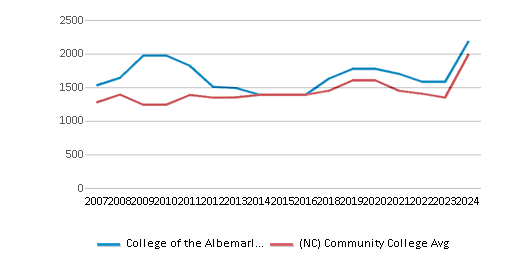
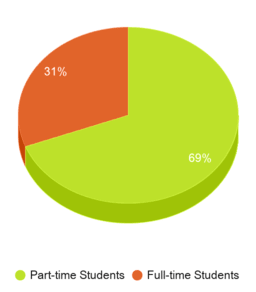
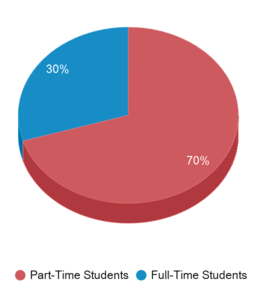
# Enrollment Undergraduate
316 students
316 students
# Full-Time Undergraduate Students
973 students
766 students
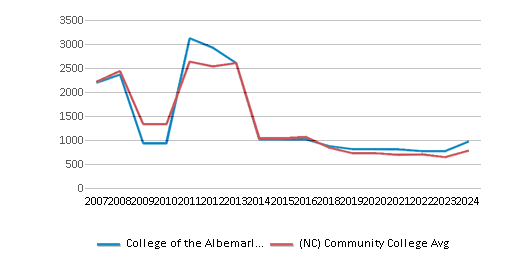
# Full-Time Graduate Students
n/a
22 students
# Part-Time Undergraduate Students
2,187 students
1,990 students
# Part-Time Graduate Students
n/a
3 students
Total Dormitory Capacity
n/a
717 students
% American Indian/Alaskan
1%
1%
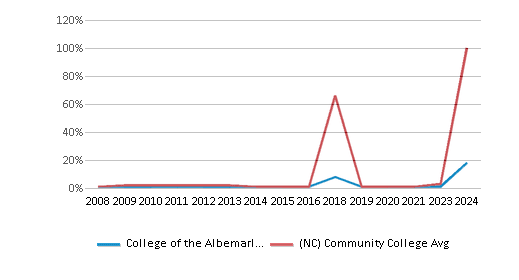
% Asian
1%
3%
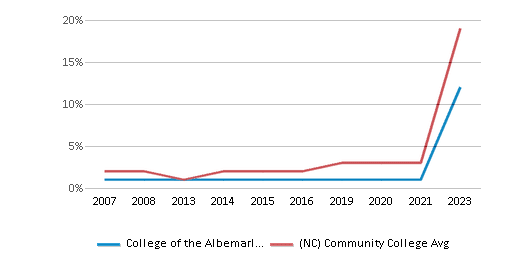
% Hispanic
6%
13%
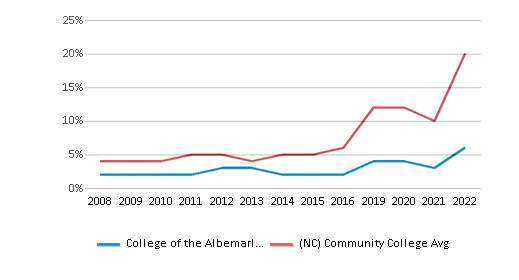
% Black
13%
21%
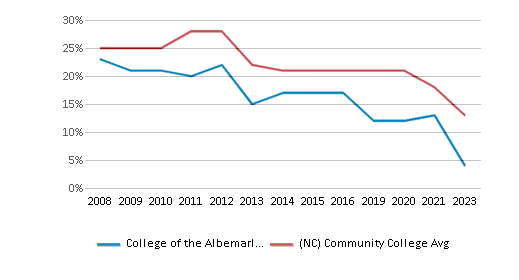
% White
62%
52%
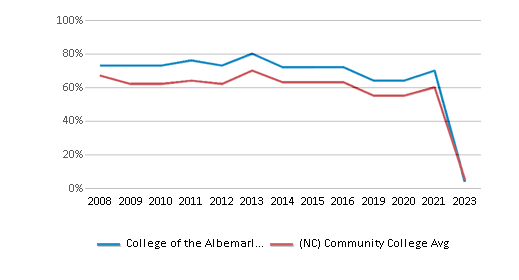
% Hawaiian
n/a
1%
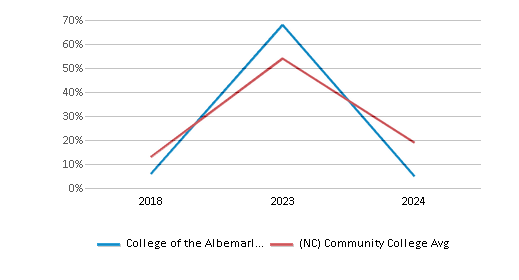
% Two or more races
3%
3%
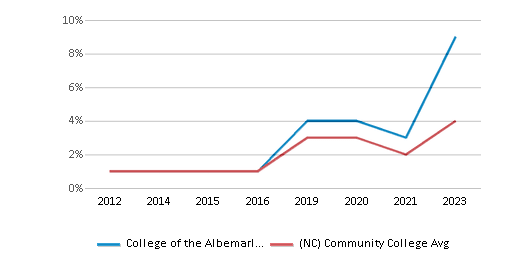
% Non Resident races
4%
1%
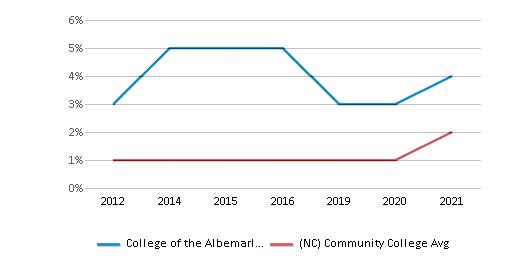
% Unknown races
11%
5%
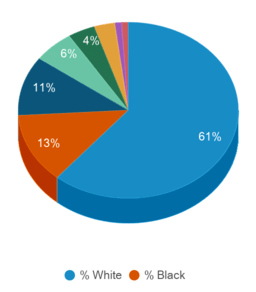
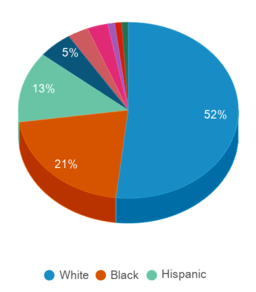
Diversity Score
0.59
0.66
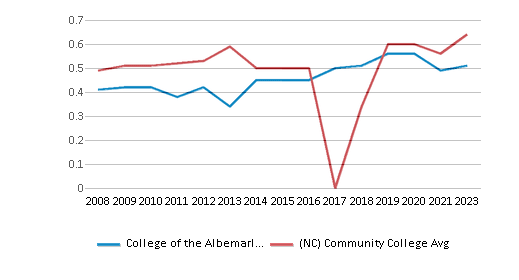
College Completion Rate (Students who graduate in less than 4 years)
0.4211%
0.3684%
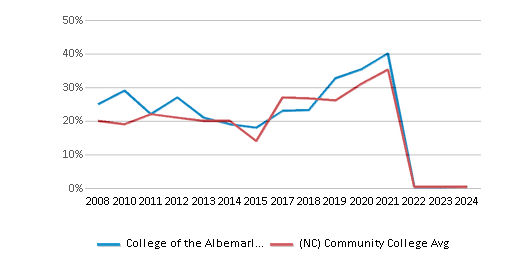
College Completion Rate (Students who graduate in 4 years or more than 4 years)
n/a
0.4286%
Average Graduate Earnings (10 Years)
$25,600
$27,500
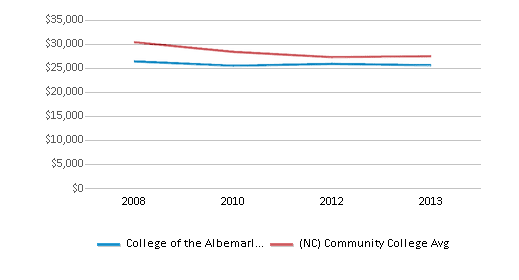
Tuition and Acceptance Rate
The public in-state tuition of $2,102 is less than the state average of $3,915. The in-state tuition has declined by 7% over four years.
The public out-state tuition of $7,404 is less than the state average of $9,508. The out-state tuition has declined by 8% over four years.
In-State Tuition Fees
$2,102
$3,915
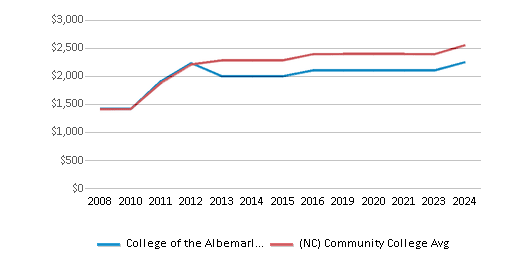
Out-State Tuition Fees
$7,404
$9,508
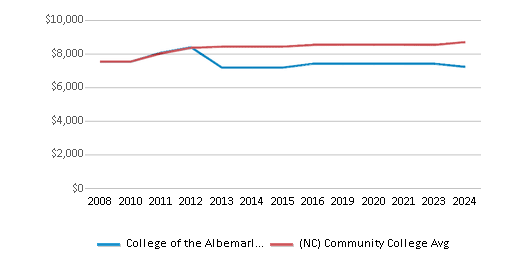
% Students Receiving Some Financial Aid
99%
82%
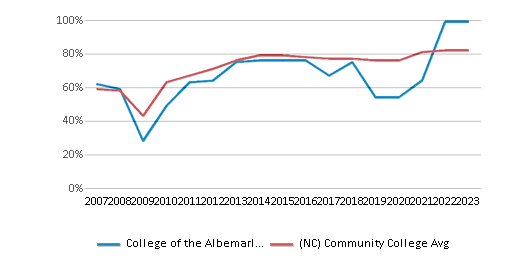
Median Debt for Graduates
$4,625
$9,500
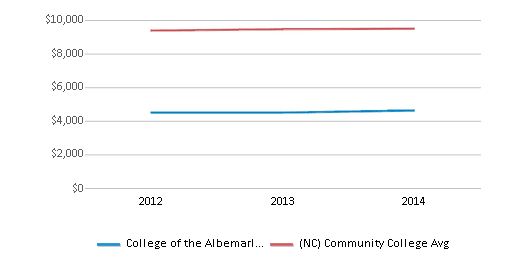
Median Debt for Dropouts
$3,887
$5,500
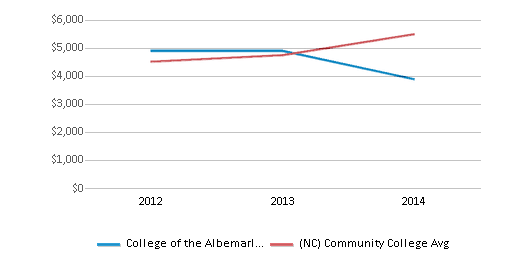
Acceptance Rate
n/a
82%
SAT Reading
n/a
488
SAT Math
n/a
498
ACT Composite
n/a
20
ACT English
n/a
13
ACT Math
n/a
16
Source: 2024 (or latest year available) Integrated Postsecondary Education Data System (IPEDS)
School Notes
- Whether you are a basic skills, continuing education, vocational, technical or college transfer student; or a community member seeking business & industry training or cultural enrichment, COA has much to offer. COA can help you meet your educational and career goals. Many of our services are free, and all of them are relatively inexpensive, making COA an affordable investment in your future. Elizabeth City became home to COA in 1961 when College of The Albemarle became the first community college in the state chartered under the Community College Act of 1957. In 1963, the college was approved as the first comprehensive community college in the North Carolina Community College System. The college's 75-acre Elizabeth City Campus is located on Highway U.S. 17 North in Elizabeth City. On that campus, six major buildings provide space for administrative and faculty offices, classrooms, laboratories, a college bookstore, a student center, the Learning Resources Center, a lecture auditorium, a learning lab, the COA Auditorium, the Technology Center, a Basic Skills Lab, and a Health Sciences Center. Credits earned at College of The Albemarle in curricula leading to the Associate in Arts degree, the Associate in Science degree, the Associate in Fine Arts degree, and some of those leading to the Associate in Applied Science degree and the Associate in General Education degree, are transferable to senior colleges and universities for a higher degree. College of The Albemarle is a member of the North Carolina Community College System. College of The Albemarle is accredited by the Commission on Colleges of the Southern Association of Colleges and Schools to award associate degrees, diplomas, and certificates.
Frequently Asked Questions
How much does College of the Albemarle cost?
College of the Albemarle's tuition is approximately $2,102 for In-State students and $7,404 for Out-State students.
What is College of the Albemarle's ranking?
College of the Albemarle ranks among the top 20% of community college in North Carolina for: Least expensive tuition and Percent of students receiving financial aid.
Recent Articles

Obtaining Your Bachelor's Degree at a Community College
Explore the evolving landscape of community colleges offering bachelor's degrees, addressing affordability, accessibility, and workforce needs.

A to Z of Community College Certificates and Courses
From business and healthcare to technology and skilled trades, the article showcases the breadth of options available to students seeking to enhance their knowledge, develop new skills, or pursue career advancement.

What is a Community College?
This comprehensive guide explains what a community college is, its history, and its role in higher education. It covers the types of programs offered, differences from four-year colleges, benefits of attending, and important considerations for prospective students, providing valuable insights for those exploring educational options.

